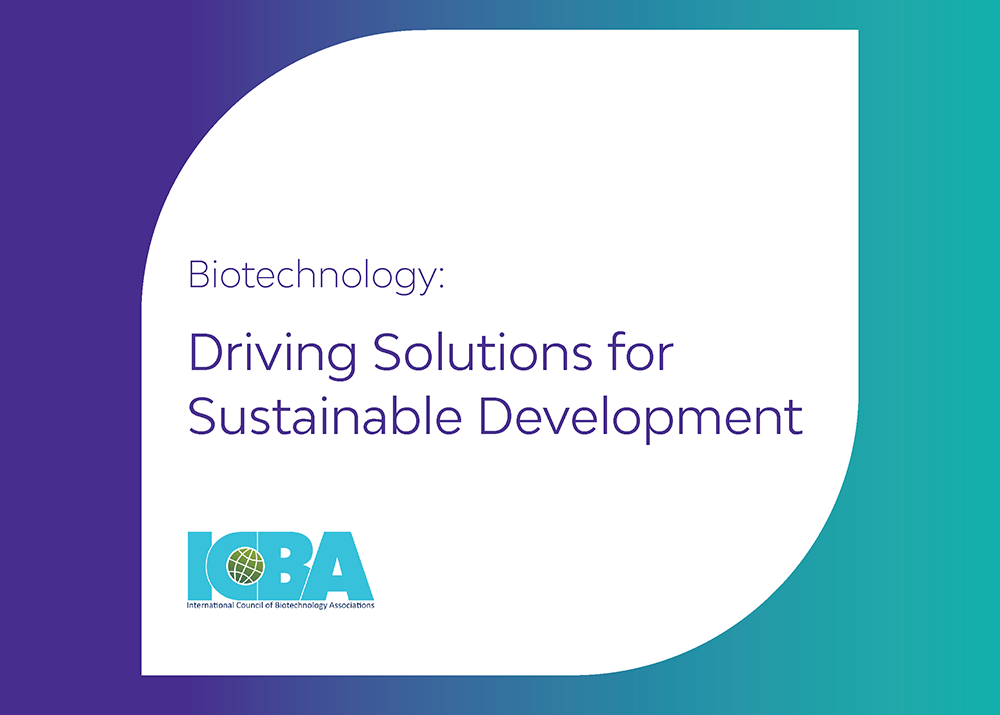Biotech has an essential role in achieving sustainable development, says a new report, Biotechnology: Driving Solutions for Sustainable Development. The report was published on Dec. 21 by the Biotechnology Innovation Organization (BIO) in collaboration with the International Council of Biotechnology Associations (ICBA).
The latest iteration of the annual report was released just after the COP28 U.N. Climate Conference in Dubai, where biotech received greater attention. The report outlines biotech’s current and potential contributions to the 17 Sustainable Development Goals (SDGs). The United Nations adopted the SDGs as a part of the 2030 Agenda for Sustainable Development.
ICBA represents biotech associations from around the world. BIO is the largest such association. Their joint report highlights the work of biotech innovators around the globe.
“Biotechnology can—and often already is—providing tools needed to feed, fuel, and heal communities worldwide. This important research details how best to leverage biotechnology for advancing equity and more sustainable development,” according to BIO Chief Policy Officer John Murphy.
Biotechnology and sustainable development, goal-by-goal
The report is broken down by the 17 UN SDGs, highlighting biotech innovations that forward each goal.
Goal 1. No poverty: “Biotechnological innovations contribute to poverty reduction by supporting the resilience of crops and farmers, improving living conditions and health outcomes, and increasing access to affordable medical therapies,” according to the report. Examples include drought-tolerant corn, pest-resistant cowpea, and rice high in vitamin A.
Goal 2. Zero hunger: “Innovations in plant breeding have substantially transformed the efficiency of food production since the mid-20th century, with innovations improving crop yields and the nutritional values of food crops,” says the report, highlighting herbicide-resistant crops, more productive crops, and nutrient-fortified biotech crops.
Goal 3. Good health and well-being: “Biotechnological innovations are not only bringing new vaccines and therapies to patients, but also finding cures for diseases that were once incurable,” says the report. A key example: rapid clinical trials of vaccines.
Goal 4. Quality education: “Biotech companies invest in the future of innovation by creating educational opportunities for all levels, but especially younger populations,” says the report. It notes two Amgen initiatives: Amgen Biotech Experience for classrooms and the Amgen Scholars Program supporting summer research.
Goal 5. Gender equality: “Biotechnology can develop gender-inclusive opportunities in healthcare, focus on empowering women in science, and invest in gender-transformative opportunities,” says the report, which highlights the Biotech Sisterhood.
Goal 6: Clean water and sanitation: “Biotechnology companies develop solutions that reduce water usage and waste, and ensure that water is safe from contaminants,” says the report. These include biofilters and biosensors to keep water clean, and crops developed to use less water.
Goal 7. Affordable and clean energy: “Biotech innovations have led to the development of fuel alternatives like biofuels and microbial fuel cells, which use bacteria to convert chemical energy into electrical energy,” says the report. Increased biofuel production reached 23 billion gallons per year in the United States, a 6% increase from January 2022.
Goal 8. Decent work and economic growth: “The global biotechnology market is currently valued at $752.8 billion and growing. The development of breakthrough health initiatives from biotech will transform our future as we tackle global crises,” says the report. Genetically engineered crops create economic opportunities for farmers, the biotech industry provides jobs, and medical advances keep the workforce healthy and productive.
Goal 9. Industry, innovation, and infrastructure: “Biotech companies are fueling a new wave of innovation,” says the report, mentioning efforts like the African Access Initiative (AAI) and the BIO International Convention, as well as research parks and institutes promoting biotech.
Goal 10. Reduced inequalities: “Biotech companies are constantly finding innovative solutions to global challenges and are consequently creating opportunities to reduce inequalities,” says the report. Of note, Genentech’s Health Equity and Diversity in Stem Innovation Fund promotes clinical trial equity and education.
Goal 11. Sustainable cities and communities: “Biotechnology can contribute to sustainable urban development by providing innovative solutions in areas such as waste management and energy production. For example, biofuels produced from urban waste can provide a renewable source of energy, while biotechnological processes can be used to treat wastewater,” the report says.
Goal 12. Responsible production and consumption: “Biotechnology can play a key role in promoting sustainable consumption and production patterns.” This includes biodegradable bio-based materials and bio-based plastics that don’t use fossil fuels. Genetically engineered crops can grow with fewer chemical inputs.
Goal 13: Climate action: “Biotechnological innovations can help mitigate climate change by reducing greenhouse gas emissions,” says the report. “Moreover, genetically modified crops are more resilient and adaptable to changing climate conditions, thereby ensuring food security.” The report highlights sustainable aviation fuel and LanzaTech’s bio-ethanol innovations that turn waste carbon into fuel.
Goal 14. Life below water: “Biotechnology supports the development of sustainable aquaculture practices, which can help ensure food security without depleting marine biodiversity,” including with innovations that prevent pollution from runoff. The report mentions AquaBounty’s bioengineered fish and OrganoBait’s synthetic alternative to bait.
Goal 15. Life on land: “Biotechnology is a promising tool for improving soil health and nutrient cycling in sustainable agriculture,” the report says. Biofertilizers and biopesticides can enhance soil health and productivity. Genetically engineered crops can require less pesticides or fertilizer while being more productive.
Goal 16. Peace, justice, and strong institutions: “Biotechnology advancements are helping to address health disparities and ensure that lifesaving treatments and vaccines are accessible to all,” says the report. “Ethical and responsible use of biotechnological innovations can promote peaceful and inclusive societies.” This includes better health, environmental protection, and food security.
Goal 17. Partnership for the goals: “Biotechnology companies often engage in partnerships with governments, NGOs, academia, and other stakeholders,” says the report. Among the many examples cited are BIO Ventures for Global Health.




